Finally I downloaded Oracle Site Studio 10gR4, the latest release. Every time I was trying to download it, it fails. But that's because of internet connection of course, where I am currently in Dubai and internet access from hotel is very expensive, so I access internet from any coffee shop.
Anyway I downloaded it and after I explore it, I will blog on it. I heard about that release from one month in Customer Update Webcast that is being held every three months by Oracle.
You should download it, and try it because of the many enhancements added to it.
Wednesday, January 28, 2009
Using File Store Provider to Store Content files in database
Using File Store Provider to Store Content files in database
Here are the steps for doing this
I still have questions about File Store providers, and I wish some can help me
Here are the steps for doing this
- Open Content Server providers page
- From the providers page edit “DefaultFileStore” provider, by opening “Info” link
- Enable file store provider by clicking on “Upgrade” button
- Restart content server
- Repeat Sep 1 and 2, and then click on “Edit” button
- By default, there is a Storage Rule created for you, and we will edit this rule (if you want, you can add new rule). In “Edit File Store Provider” page, click on “Edit Rule”
- “Storage Rule” page, choose “JDBC Storage” option, and in “Renditions” list, don’t choose anything (not choosing any rendition option means, we will store both the original file and weblayout file in the database). Don’t change Path information.
- Open “File Store Administration” page
- Click on “Add Partition” button
- On “Add Partition” page, add “Partition Name” field that you want, and in “Duplication Methods” choose link which means that if the original file has not been converted, a link to the original file will be used (instead of making a copy of the file, which is duplicating the content)
- Restart content server
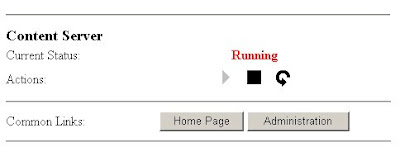
- We want to test what we did, so we will check-in a new file into the content server.
- Query the database table “FileStorage”, you will find primary file and weblayout files added into two records and that two records identified by dID


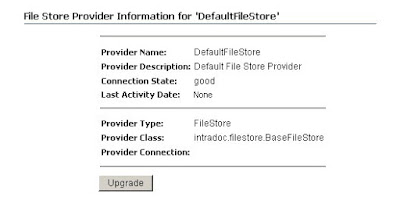

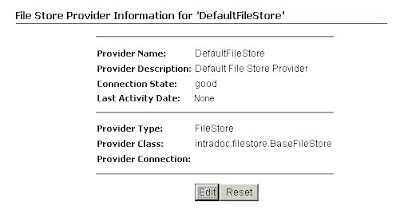
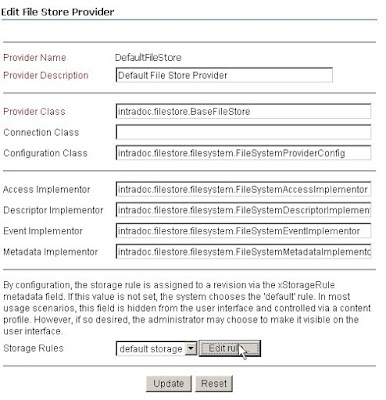
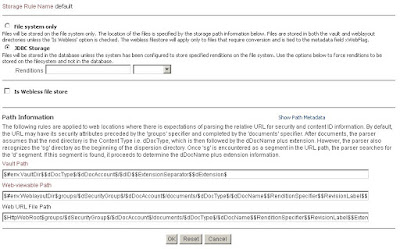
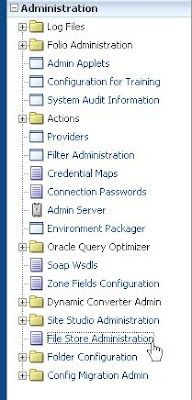
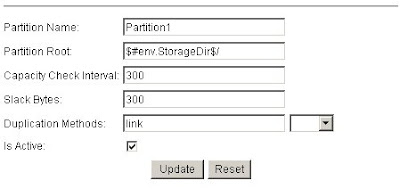
Note, choosing link in “Duplication Method”, will save space in the database, because large part the content will not be converted
I still have questions about File Store providers, and I wish some can help me
- How many partitions should I create?
- What about the old content that is already stored in file system?
Sunday, January 25, 2009
BUG: DRG-10599: column is not indexed
I got this error message "DRG-10599: column is not indexed ", I tried to solve it using Content Server Zone Field Configuration but I failed. Where The problem was from dDocFulltext field in IdcColl1 & IdcColl2 tables.
I solved it by indexing that field directly on the database, using this query
CREATE INDEX idxDDOCFULLTEXT1 ON STELLENT.IDCCOLL1(DDOCFULLTEXT) INDEXTYPE IS CTXSYS.CONTEXT PARAMETERS ('SYNC (ON COMMIT)')
CREATE INDEX idxDDOCFULLTEXT2 ON STELLENT.IDCCOLL2(DDOCFULLTEXT) INDEXTYPE IS CTXSYS.CONTEXT PARAMETERS ('SYNC (ON COMMIT)')
If you have the same problem with dDocFullText use that query, but If you have it with other fields use Zone Field Configuration
I solved it by indexing that field directly on the database, using this query
CREATE INDEX idxDDOCFULLTEXT1 ON STELLENT.IDCCOLL1(DDOCFULLTEXT) INDEXTYPE IS CTXSYS.CONTEXT PARAMETERS ('SYNC (ON COMMIT)')
CREATE INDEX idxDDOCFULLTEXT2 ON STELLENT.IDCCOLL2(DDOCFULLTEXT) INDEXTYPE IS CTXSYS.CONTEXT PARAMETERS ('SYNC (ON COMMIT)')
If you have the same problem with dDocFullText use that query, but If you have it with other fields use Zone Field Configuration
Saturday, January 24, 2009
ECM Workshop - Dubai
I am currently in Dubai, and I am giving first Oracle UCM workshop there for partners. It's my first visit to Dubai, and I liked it, where everything in Dubai is new and organized.
I finished my first week in the workshop, and I have some comments on the workshop. Before writing my comments, I want to say, this is my second UCM workshop and might be I don't have enough experience in teaching.
My comments are as following
- Workshop attendees are from different knowledge backgrounds, I have Business Analysts, I have coders (only, they need code), I have administrators, and I have technical consultants
- I have fuzzy agenda for the workshop
- I didn't get any support from Oracle guys in Dubai regarding partners Orientation
- Attendees are employees in Oracle Partners, and they need me to give them a complete real scenario for implementing UCM, and everyone has his own scenario
- They want me to compare between UCM and other compatitor products, however no one of them heard about ECM, and any related standards
I don't know if my comments are right or not, but I think partners need more orientation, and If they want to work on ECM market, they will need to learn about ECM concepts in general. Where those partners want to reply on tenders and they want to estimate costs, also they want to design a solution for the customer. I can not learn them everything because of the workshop time, and I am just covering administration , using, and Site Studio.
The problem of choosing workshop attendees, As I saw those partners are not willing to dedicate resources for UCM, but they are catching opportunities and allocating resources according to the opportunity but as an example, the problem if they are allocating developers for that opportunities, the developers will try to customize all the application or building another application using J2EE and making UCM as back-end, where developers have not enough UCM knowledge.
In general I am not satisfied with ECM market in Middle East and especially with UCM.
I finished my first week in the workshop, and I have some comments on the workshop. Before writing my comments, I want to say, this is my second UCM workshop and might be I don't have enough experience in teaching.
My comments are as following
- Workshop attendees are from different knowledge backgrounds, I have Business Analysts, I have coders (only, they need code), I have administrators, and I have technical consultants
- I have fuzzy agenda for the workshop
- I didn't get any support from Oracle guys in Dubai regarding partners Orientation
- Attendees are employees in Oracle Partners, and they need me to give them a complete real scenario for implementing UCM, and everyone has his own scenario
- They want me to compare between UCM and other compatitor products, however no one of them heard about ECM, and any related standards
I don't know if my comments are right or not, but I think partners need more orientation, and If they want to work on ECM market, they will need to learn about ECM concepts in general. Where those partners want to reply on tenders and they want to estimate costs, also they want to design a solution for the customer. I can not learn them everything because of the workshop time, and I am just covering administration , using, and Site Studio.
The problem of choosing workshop attendees, As I saw those partners are not willing to dedicate resources for UCM, but they are catching opportunities and allocating resources according to the opportunity but as an example, the problem if they are allocating developers for that opportunities, the developers will try to customize all the application or building another application using J2EE and making UCM as back-end, where developers have not enough UCM knowledge.
In general I am not satisfied with ECM market in Middle East and especially with UCM.
Saturday, January 10, 2009
Cloud , Utility , and Grid Computing.
Like Web2.0, Cloud Computing is a fuzzy word, and everyone seems to have a different definition for it.
I like this definitions that I found in Wikipedia:
 "It is a style of computing in which IT-related capabilities are provided “as a service”, allowing users to access technology-enabled services from the Internet ("in the cloud") without knowledge of, expertise with, or control over the technology infrastructure that supports them."
"It is a style of computing in which IT-related capabilities are provided “as a service”, allowing users to access technology-enabled services from the Internet ("in the cloud") without knowledge of, expertise with, or control over the technology infrastructure that supports them."
We can see from this definition the relation between cloud computing and SaaS (Software as a Service), where you provide software solutions as services on internet (it is stored on internet, and cached on your machine) like Google Calendar, GTalk, Google Docs applications offered by Google Apps.
In cloud computing, information and persistence data is permanently stored in servers and data centers on the internet and cached temporarily on clients
I am not sure about the difference between cloud computing and grid computing, but I think cloud computing is using and utilizing grid computing.
I am still confused about the difference between Cloud Computing, Utility Computing, and Grid Computing.
I like this definitions that I found in Wikipedia:
 "It is a style of computing in which IT-related capabilities are provided “as a service”, allowing users to access technology-enabled services from the Internet ("in the cloud") without knowledge of, expertise with, or control over the technology infrastructure that supports them."
"It is a style of computing in which IT-related capabilities are provided “as a service”, allowing users to access technology-enabled services from the Internet ("in the cloud") without knowledge of, expertise with, or control over the technology infrastructure that supports them."We can see from this definition the relation between cloud computing and SaaS (Software as a Service), where you provide software solutions as services on internet (it is stored on internet, and cached on your machine) like Google Calendar, GTalk, Google Docs applications offered by Google Apps.
In cloud computing, information and persistence data is permanently stored in servers and data centers on the internet and cached temporarily on clients
I am not sure about the difference between cloud computing and grid computing, but I think cloud computing is using and utilizing grid computing.
I am still confused about the difference between Cloud Computing, Utility Computing, and Grid Computing.
Subscribe to:
Comments (Atom)